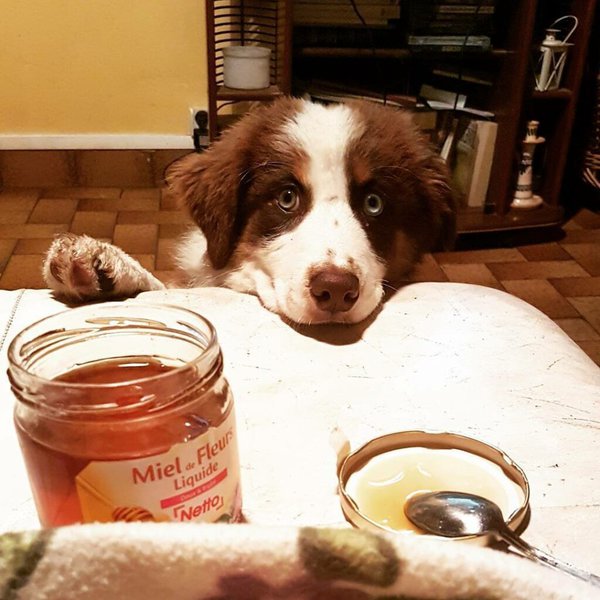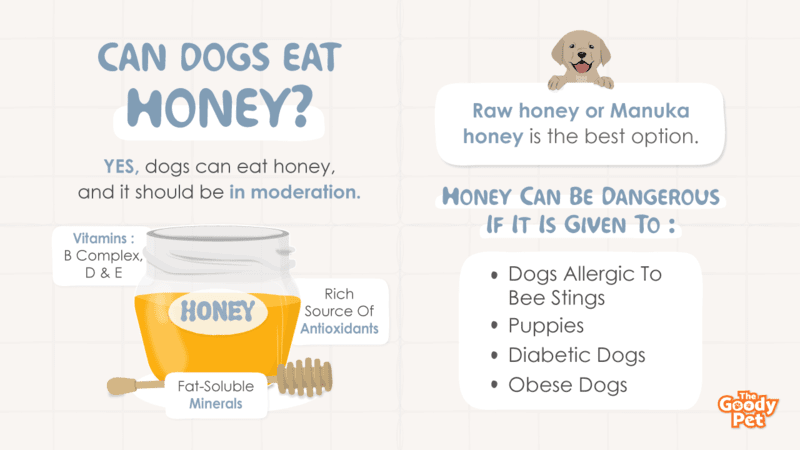Honey ranks high as a superfood for both humans and dogs due to its medicinal and nutritional benefits. The “nectar of the Gods” is tasty and nutritious, making it the delight of both pooches and humans for generations. Since its discovery dated in 5500 B.C., honey remains one of the most commonly used sweeteners in the world.
Yes, dogs can eat honey, yet they should not be consuming honey in excess. Moderate consumption of honey by dogs offers nutritional benefits, such as vitamins A, C, and E. These vitamins offer significant healing benefits, such as boosting immune health and treating coughs.
Honey for dogs is not a controversial topic. Yet, it is not recommended to assume that pooches can eat it as much as they want. In this article, you will understand the safety of honey for your canine. You will also learn the health and nutritional benefits it offers to your pooch, especially when eaten moderately.
Can Dogs Eat Honey?

Dogs can eat honey. However, it should be in moderation. It offers several nutritional benefits to your pooch because it contains vitamins A, C, D, E, and K. It is also a great source of potassium, zinc, iron, calcium, magnesium, copper, and manganese.
Is Honey Safe For Dogs?
Honey is a product of the labor of bees, which collect nectar from flowering plants and deposit it in their second stomach. It is very sugary and ranks high in the glycemic index. It is safe for dogs when eaten in moderation because it does not lead to any form of health complications. Besides, it is nutritious even though its nutrient content is on the micro-level.
Nonetheless, there are certain factors that might make honey dangerous for your pooch. Some of them include:
Dogs Allergic To Bee Stings
It is not the best idea to give honey to a pooch that is allergic to bee stings because such a dog can also react to honey. For such canines, you can start with a drop of honey and observe the reaction to know whether it is safe to continue or not.
Puppies
It is likely that puppies react to honey because their immune system is still in the developmental stage. So, it is not advisable to give them raw honey to avoid food poisoning.
Diabetic Dogs
Due to the high sugar level of honey, it is not recommended to give honey to diabetic dogs. It can end up complicating their condition.
Obese Dogs
It is not safe to give honey to obese dogs to avoid the extra sugar content of honey. Such dogs will not benefit from the nutritional value of honey.
Will Honey Give My Dog Diarrhea?
It is critical that you consider the likelihood of honey giving your dog diarrhea. This is very important, especially for younger dogs. Due to the stage of development of the digestive and immune systems of puppies, they can hardly tolerate anything above one teaspoon of honey per day.
Also, at that stage, it is not recommended to give them processed supermarket products. Local honey or Manuka honey is the best option for them to avoid health complications. If your dog has a sensitive digestive system, honey can lead to diarrhea and stomach upset. For such dogs, it is better that you talk to your vet before considering giving them honey.
If you choose to give honey to such dogs, ensure that you go easy on them. Let them have a little and observe their reactions. It is also possible that honey makes your dog vomit. This is due to its very high sugar content. If you notice anything strange, do not hesitate to speak to your vet as soon as possible.
What Are The Benefits Of Honey For Dogs?

Honey has numerous health and nutritional benefits that make it worthwhile as a sweetener for your dog. Many of these benefits are proven by scientific studies, while the rest has been confirmed by anecdotal evidence.
Nutritional Benefits Of Honey For Dogs
In terms of nutritional value, here are the top benefits honey brings to dogs:
Rich Source Of Antioxidants
Honey is a good source of antioxidants. It also contains flavonoids and phenolic acids, which makes it a powerful antioxidant. This implies that the consumption of honey will help your pooch fight off free radicals that lead to cell damage. It will also reduce inflammation and boost the immune system of your dog.
Vitamins B Complex
It also contains B-complex vitamins, which are fat-soluble vitamins that regulate the immune system and supports bone health. These vitamins also boost the energy levels of dogs, metabolism, and brain function. It also contains vitamins A and C, making it beneficial for dog sight and skin health.
Vitamins D And E
Honey is rich in vitamins D and E, both of which are also fat-soluble. They contribute to the blood clotting ability of your pooch, preventing infections. Therefore, if you notice that the blood of your dog struggles to clot when injured, you should consider introducing honey to the meal of your pooch.
Fat-Soluble Minerals
It also contains fat-soluble minerals such as magnesium, copper, and manganese. These minerals are essential to the production of collagen and red blood cells, preventing a low supply of blood for your pooch. They are also effective in the promotion of the growth of ligaments and tendons, bone density, and muscle development.
Healing Benefits Of Honey For Dogs
The healing properties of honey for dogs are due to its anti-inflammatory properties and its ability to offer seasonal allergy relief.
Due to its anti-inflammatory property, honey can offer relief to older dogs battling joint pain. It can also offer relief to pooches dealing with inflammation due to bug bites, wounds, and hot spots.
Also, your canine can enjoy the seasonal allergy relief honey offers because it contains trace amounts of flower pollen. This pollen is capable of stimulating the immune system of your dog. The product of this stimulation is the buildup of antibodies, which are essential in the prevention of autoimmune responses to pollen.
This pollen also contains natural chemicals such as quercetin, which is a polyphenol that offers a high quantity of antihistamines. This makes it possible for honey to offer relief to dogs battling watery eyes due to environmental allergies. Note that local honey is your best bet if you want your pooch to enjoy the healing benefits of honey.
How Much Honey To Give Dogs?
Due to the high level of sugar honey contains, it is not recommended to allow your dog to eat a high quantity of it. An excess quantity will harm canines, especially when they are diabetic or obese. One teaspoon of honey per day is enough for your pooch unless your vet says otherwise.

What Type Of Honey Is Safe For Dogs?
Raw or Manuka honey is safe for your dog. Manuka honey is derived from the Manuka forest in New Zealand. It is famous for its abundant antibacterial properties. If you offer processed honey to your dog, the health benefits will not be available due to the use of methods such as heating in its production.
Can Dogs Have Clover Honey?
Clover honey is produced by honeybees whose source of nectar is the clover plant. This type of honey is safe for your dog and can also offer health benefits such as cough relief for pooches by soothing their throat. Yet, it should only be consumed in small quantities. Its processed form should also be avoided.
Can Dogs Have Honeycomb?
Honeycomb is produced by honey bees for the purpose of housing their larvae and storing honey. It is a series of hexagonal cells that contains raw honey. There is no cause for alarm if your dog eats honeycomb. It offers the same nutritional and health benefits as raw honey. It is safe and beneficial to your pooch.
Is Honey Good For Dog Allergies?
Honey is effective for helping dogs battling one form of allergy or the other. However, it is not every form of honey that can be beneficial in this regard. Raw or locally-sourced honey is your best bet if you want your dog to enjoy the medicinal benefits that honey provides.
This type of honey contains the same pollens in the environment of your pooch, reducing sensitivity to them. One teaspoon of honey is enough for older dogs, but you should consider half a teaspoon per day for younger canines.

Lemon And Honey For Dogs’ Cough
Manuka honey is known for its ability to offer relief to dogs battling coughs because it soothes their throat. Also, a mixture of one teaspoon of honey and lemon juice can be potent in this regard. You will observe the changes in the condition of your pooch after licking the mixture on a spoon.
Raw Honey For Dogs
Due to their care for their pooches, many dog owners are wary of giving raw honey to their pets. Their fear is understandable because they are careful of the possibility of infections. However, there is no cause for alarm if you choose to give raw honey to your dog. In fact, the medicinal benefits of honey are at their peak in its raw form.
Raw honey offers antibacterial, antifungal, and antimicrobial qualities to your dog. It also contains powerful antioxidants.
Therefore, giving raw honey to your pooch is not a dangerous endeavor. Rather, it can offer several health benefits to dogs, such as the prevention of infection and inflammation.





